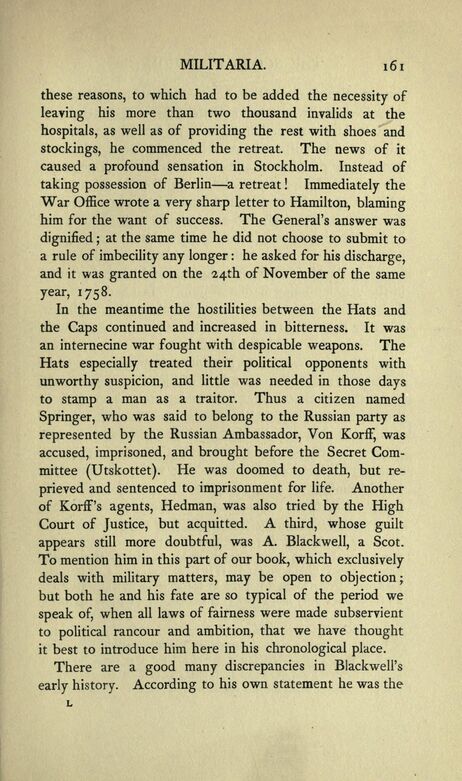
Full resolution (JPEG) - On this page / på denna sida - Sidor ...

<< prev. page << föreg. sida << >> nästa sida >> next page >>
Below is the raw OCR text
from the above scanned image.
Do you see an error? Proofread the page now!
Här nedan syns maskintolkade texten från faksimilbilden ovan.
Ser du något fel? Korrekturläs sidan nu!
This page has never been proofread. / Denna sida har aldrig korrekturlästs.
these reasons, to which had to be added the necessity of
leaying his more than two thousand invalids at the
hospitals, as well as of providing the rest with shoes and
stockings, he commenced the retreat. The news of it
caused a profound sensation in Stockholm. Instead of
taking possession of Berlin—a retreat! Immediately the
War Office wrote a very sharp letter to Hamilton, blaming
him for the want of success. The General’s answer was
dignified; at the same time he did not choose to submit to
a rule of imbecility any longer: he asked for his discharge,
and it was granted on the 24th of November of the same
year, 1758.
In the meantime the hostilities between the Hats and
the Caps continued and increased in bitterness. It was
an internecine war fought with despicable weapons. The
Hats especially treated their political opponents with
unworthy suspicion, and little was needed in those days
to stamp a man as a traitor. Thus a citizen named
Springer, who was said to belong to the Russian party as
represented by the Russian Ambassador, Von Korff, was
accused, imprisoned, and brought before the Secret
Committee (Utskottet). He was doomed to death, but
reprieved and sentenced to imprisonment for life. Another
of Korff’s agents, Hedman, was also tried by the High
Court of Justice, but acquitted. A third, whose guilt
appears still more doubtful, was A. Blackwell, a Scot.
To mention him in this part of our book, which exclusively
deals with military matters, may be open to objection;
but both he and his fate are so typical of the period we
speak of, when all laws of fairness were made subservient
to political rancour and ambition, that we have thought
it best to introduce him here in his chronological place.
There are a good many discrepancies in Blackwell’s
early history. According to his own statement he was the
L
<< prev. page << föreg. sida << >> nästa sida >> next page >>